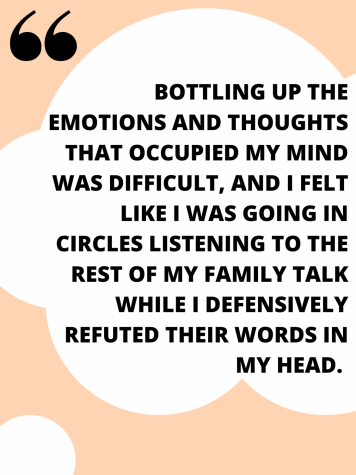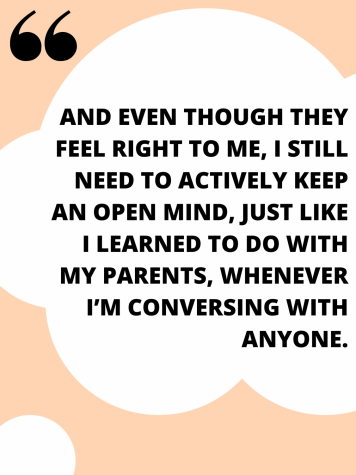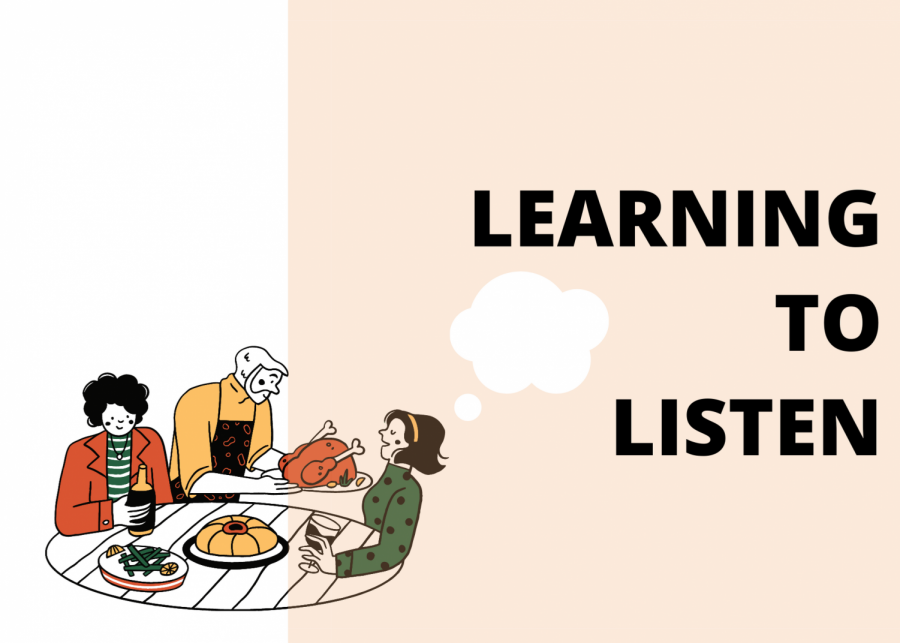Learning to listen
Navigating the reality of having differing views from family
March 13, 2021
If I had to pinpoint one aspect of my life that undoubtedly shaped me into the person I am today, it would be the conversations I have with my family over dinner. Dinner time in our family is one of the few moments when we’re all in one place, and we collectively reflect on our days.
I know it doesn’t sound very interesting at first, and to be honest, I never really thought much about it until around a year ago. But I guess that’s the beauty of it — I’ve sat through 17 years of family dinners, and from a lot of them, I’ve subconsciously taken in a lot of what I hear and what we discuss (yes, we are the type of family to discuss politics at the dinner table).
Looking back, every facial expression my young adolescent self made in response to what I’d hear my parents or older sister say was just another way for me to not only express my thoughts, but also slowly solidify them. I have always accepted that sharing my parents’ beliefs, whether on politics, religion, customs and more was the norm — doubting or going against what I grew up hearing seemed like too much work, and sometimes, even disrespectful.
But as I grew older, I realized that every time my eyebrows scrunched in confusion and my jaw dropped in dismay in response to my family members’ words, I was essentially doing the inevitable — forming my own values and opinions, and realizing that it’s OK to disagree with my loved ones. And so eventually, around elementary to middle school, I started to participate in these conversations and began to share my thoughts rather than just silently listening. Don’t worry, though, my five-year-old self retained, at most, eight percent of actual conversations — I probably only cared when they talked about food.
When I started verbally responding and joining in on the discussions, another (obvious) realization was that differing opinions between each family member often lead to arguments or debates ending in frustration. Maybe it was because it felt draining having to argue my views and points every evening, or maybe it was because I thought I was wasting my time on people who I was convinced were wrong (because I assumed I was always right). But for a while, I stopped engaging in these conversations. I reverted back to my silent, five-year-old self.
Surprisingly (not really), that wasn’t a healthy choice — bottling up the emotions and thoughts that occupied my mind was

difficult, and I felt like I was going in circles listening to the rest of my family talk while I defensively refuted their words in my head. I had too much I wanted to say, but I also disliked how our conversations would escalate, and part of me questioned why I had to explain basic human rights to my family. Seems preposterous, right?
What’s so hard about understanding human decency?
Well, as it turns out, it’s not that preposterous. Because when taking into account my parents’ culture, childhood, experiences as immigrants, the generational divide between us and other factors, to them, I’m the one who’s being preposterous.
And that leads me to these questions: Who’s wrong and who’s right? Whose morals need to be checked? Mine or theirs?
The truth is, it took a lot of self-reflection and screen time (for reading articles in an attempt to further educate myself on topics we talked about) to come to the understanding that holding opposing views isn’t a categorical issue — sometimes there is overlap or gray area that make none of us right or wrong. And don’t get me wrong: I would never condone blatant hatred and baseless claims. But if it’s something I disagree with because I’m unable to follow the line of reasoning, I realize that attempting to understand where my parents are coming from and acknowledging why we hold different opinions are much better options than resorting to “You’re wrong” after each exchange.
Granted, frustration is unavoidable. Sometimes I still hear “You’re just being brainwashed” or “You’re too young, you don’t know anything.” And yes, I will occasionally call my parents’ views “dumb” as an empty rebuttal out of anger. But despite that, I’m fortunate enough to have parents who take the time to listen and try to understand where I come from, and I take steps to do the same for them.

My values and opinions may not always be right in everyone’s eyes (as I’ve come to realize), but they feel moral and correct to me, even if they stray away from the values I grew up learning. And even though they feel right to me, I still need to actively keep an open mind, just like I learned to do with my parents, whenever I’m conversing with anyone. After all, eyebrow scrunching and jaw-dropping can only convey so much — we need to make an effort to recognize others’ beliefs if we want to have meaningful discussions.

















